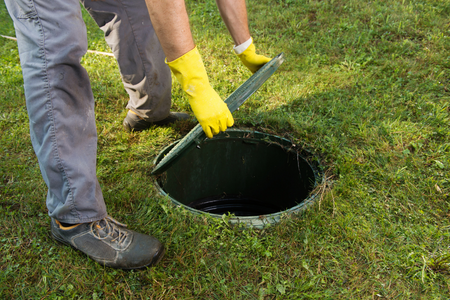Septic Tank Inspection
North Georgia's Septic Inspection Specialist
Septic tank inspections play a crucial role in maintaining the functionality and longevity of septic systems. These inspections involve a comprehensive assessment of the septic tank, distribution system, and drain field. By conducting regular inspections, potential issues can be identified early on, allowing for timely repairs and preventing costly and disruptive problems down the line.
During a septic tank inspection, RR Septic will carefully examine the condition of the tank, looking for any signs of damage, leaks, or structural issues. We usually measure the levels of sludge and scum to determine if pumping is necessary. Additionally, the inspection includes a thorough evaluation of the distribution system, including pipes, baffles, and the distribution box, to ensure proper flow and efficient distribution of effluent.
The drain field, or leach field, is another crucial component that is evaluated during a septic tank inspection. The inspector will assess the field for signs of saturation, pooling, or any other issues that could impact its functionality. By detecting any problems early, such as clogged or damaged drain pipes, appropriate measures can be taken to prevent system failure and the contamination of surrounding soil and groundwater.
Most importantly, septic tank inspections provide homeowners with peace of mind, as they help maintain a healthy and well-functioning septic system. Regular inspections, typically recommended every 3 to 5 years, allow for proactive maintenance and can significantly extend the lifespan of the septic system. By investing in these inspections, homeowners can avoid expensive repairs, sewage backups, and environmental hazards, ensuring the long-term efficiency and sustainability of their septic systems.
Reliable Septic Tank Inspections
Overall, septic tank inspections provide homeowners with peace of mind, as they help maintain a healthy and well-functioning septic system. Regular inspections, typically recommended every 3 to 5 years, allow for proactive maintenance and can significantly extend the lifespan of the septic system. By investing in these inspections, homeowners can avoid expensive repairs, sewage backups, and environmental hazards, ensuring the long-term efficiency and sustainability of their septic systems. For a reliable septic tank inspection, call RR Septic at (706) 300-4264.
Frequently Asked Questions About Septic Tank Inspections
-
Why is a septic tank inspection necessary?
A septic tank inspection is necessary to ensure the proper functioning of your septic system and to identify any potential issues or maintenance needs. Regular inspections help prevent costly repairs, sewage backups, and environmental contamination. They allow professionals to assess the condition of the tank, check for leaks or damage, and ensure that the system is meeting health and safety standards.
-
How often should a septic tank be inspected?
The frequency of septic tank inspections depends on various factors, such as the size of the tank, the number of occupants in the household, and the usage patterns. As a general guideline, it is recommended to have a septic tank inspection every 3 to 5 years. However, if you notice any signs of problems like slow drains, foul odors, or sewage backups, an inspection should be scheduled immediately.
-
What does a septic tank inspection involve?
During a septic tank inspection, a professional will typically perform the following tasks:
- Pumping the tank: If necessary, the inspector will pump out the accumulated sludge and scum from the tank to allow a thorough inspection.
- Visual inspection: The inspector will visually assess the condition of the tank, looking for cracks, leaks, or signs of structural damage.
- Measurement and assessment: The inspector may measure the sludge and scum layers to determine if they are within acceptable levels. Excessive buildup may indicate a need for pumping or maintenance.
- Checking the distribution system: The inspector will inspect the pipes, baffles, and distribution box to ensure proper flow and distribution of effluent.
- Drain field evaluation: The drain field or leach field will be inspected for signs of saturation, pooling, or other issues that may affect its functionality.
- Comprehensive report: The inspector will provide a detailed report summarizing their findings, recommendations, and any necessary repairs or maintenance actions.
It's important to hire a qualified professional for septic tank inspections to ensure accurate assessments and proper maintenance of your septic system.
Tell us about your septic project
326 Meeks Road
Dahlonega, Georgia 30533
Phone: 706.300.4264
Email: service@septicxperts.com


